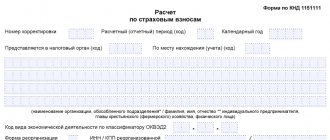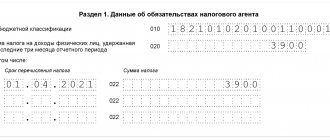At present, when the country’s economy is going through far from the best of times, businesses are trying to optimize their expenses and ensure not only a decent standard of living, but also outline prospects for the future. Some enterprises are automating production processes, others are increasing demands on employees, and others are simply reducing labor costs, which in all cases leads to a reduction in personnel in the company. In all cases, the manager tries to save the business by optimizing costs. It is necessary to clearly understand that layoffs of employees are nothing more than termination of an employment contract at the initiative of the employer (Article 81 of the Labor Code of the Russian Federation), therefore, mistakes cannot be made in this matter in order to avoid problems with the law. In this article we will look at whether severance pay is subject to insurance premiums during layoffs.
Severance pay in case of layoff
In general, the personnel reduction procedure is a very costly project for an enterprise, so many managers try to avoid this by inviting employees to write a letter of resignation of their own free will, but not all employees succumb to these persuasion, and, in fact, this is wrong. There is another opportunity to avoid quite serious expenses - to offer the employee another, vacant position in the same organization, but here the employee has the right to refuse this offer. In this case, the reduction procedure is inevitable. This article will help the manager avoid serious mistakes when planning and implementing the costs of the staff reduction procedure.
Stages of the employee reduction procedure
So, the legislation quite clearly establishes the sequence of stages of the reduction procedure (in this material we do not consider such work at the enterprise as the creation of a commission to carry out the reduction procedure, holding a general meeting of the workforce, etc.):
Stage 1 – NOTIFICATION : all employees subject to layoffs are given a notice in person and signed exactly 2 months before the date of termination of the contract at the initiative of the employer (Article 180 of the Labor Code of the Russian Federation);
Stage 2 – ORDER : the manager issues a dismissal order before the date of termination of the contract , where the employee signs to familiarize himself with this document (a copy of the order is filed in the employee’s personal file);
Stage 3 – MATERIAL : on the day of termination of the employment contract with the employee, the employer is obliged to make all payments established by law, namely Article 84.1., Article 140 of the Labor Code of the Russian Federation, namely:
- the employee is paid the entire salary for the time actually worked, taking into account all compensation, incentives, and bonus payments;
- if the employee did not use vacation, then compensation is paid for all unused vacation periods;
- all employees, without exception, are paid severance pay in the amount of the average monthly salary (in some cases, the amount of severance pay can reach six times the average monthly salary or more);
- if for any reason an employee decides to terminate the employment contract before the expiration of the two-month notice of dismissal, then such employee is entitled to pay additional compensation in the amount of average monthly earnings.
Terms and amounts of payments after termination of an employment contract
On the day of termination of the employment contract with the employee, payments do not end. According to Article 178 of the Labor Code of the Russian Federation, an employee must be paid severance pay in the following amount and within the following terms:
| Deadlines | Payments |
| On the day of dismissal | Average monthly earnings |
| Second month (during the period of employment) | Average monthly earnings |
| Third month (by decision of the employment service body, provided that within two weeks after dismissal the employee applied to this body and was not employed by it) | Average monthly earnings |
For example:
At LLC "GDE" on 04/01/2017 there will be a reduction in staff. All employees subject to this procedure were issued notices on 02/01/2017. Plasterer-painter Ivanov I.I. wrote a statement asking to reduce it on 03/01/2017. In this regard, Ivanov I.I. On the day of dismissal, the following payments will be made:
- wages accrued from 02/01/2017 to 02/28/2017;
- compensation for all unused vacation periods;
- severance pay in the amount of average monthly earnings;
- additional compensation in the amount of average monthly earnings for the period from 03/01/2017 to 03/31/2017
Ivanov I.I. it will be necessary to register for unemployment with the employment service before March 15, 2017. In this case, the former employer will have to pay compensation for the second and possibly third month if by that time Ivanov I.I. will not be employed.
Severance pay: when and how much to pay
When an organization is liquidated or there is a reduction in staffing levels, dismissed employees are given severance pay equal to the average monthly salary (Article 178 of the Labor Code of the Russian Federation), while:
- they retain their average earnings during employment, but only for 2 months from the date of dismissal;
- in special cases, the employment service may decide to maintain the employee’s average salary in the 3rd month after dismissal (when the dismissed employee applied to this service within 2 weeks, but was never hired).
In some other circumstances of dismissal, severance pay is also due, but less - in the amount of two weeks' earnings:
- if the employee does not want to move to another job recommended to him by the conclusion of doctors, or if the employer does not have such a job (clause 8, part 1, article 77 of the Labor Code of the Russian Federation),
- if the employee is completely disabled, and this conclusion is made on the basis of a medical report (clause 5, part 1, article 83 of the Labor Code of the Russian Federation),
- if an employee who previously worked in this position is reinstated (clause 2, part 1, article 83 of the Labor Code of the Russian Federation),
- if the employer has changed his location to another location, and the employee does not agree to move after him (clause 9, part 1, article 77 of the Labor Code of the Russian Federation),
- if the employee refused to work further because the terms of his employment contract changed (clause 7, part 1, article 77 of the Labor Code of the Russian Federation),
- if the employee joined the army due to conscription (clause 1, part 1, article 83 of the Labor Code of the Russian Federation).
The employer can himself provide for cases when he is ready to pay severance pay, and even set an increased amount for them, documenting this in an employment or collective agreement, or in a separate agreement with the employee (Article 178; 181.1 of the Labor Code of the Russian Federation).
Base for calculating insurance premiums
From January 1, 2021, there have been some changes in the procedure for administering insurance premiums - they have been transferred to the tax authorities, which will regulate their calculations and payments, guided by the Tax Code.
In accordance with Art. 435 of the Tax Code of the Russian Federation establishes the following tariffs for insurance premiums (in 2021 they have not changed compared to 2021):
| Name of the extra-budgetary fund | Tariff size |
| Pension Fund of the Russian Federation | 26% (22%*) |
| FSS | 2,9% |
| FF Compulsory Medical Insurance | 5,1% |
*reduced overall tariff in the Pension Fund for compulsory pension insurance:
– within the established maximum base for calculating insurance contributions for compulsory pension insurance (RUB 796,000 per year) – 22%;
– above the established maximum base for calculating insurance contributions for compulsory pension insurance – 10%.
It is necessary to understand that when calculating insurance premiums, all employee income is taken into account, including salary, compensation, incentives, and bonus payments.
Personal income tax and insurance premiums
Personal income tax is a state tax from the population and enterprises, which is mandatory and goes to the state budget.
Personal income tax is calculated as a percentage of total income . However, to correctly calculate its size, it is not necessary to take into account the costs incurred to carry out justified economic activities.
Such costs must be documented and comply with existing Russian legislation. Information on examples of these expenses, as well as the requirements for them, can be found in Article 252 of the Tax Code.
The categories of persons from whom personal income tax is collected include:
- Persons (tax-type residents) staying in Russia for a period that exceeds the limit of 183 calendar days.
- Persons receiving their income in the Russian Federation who are not tax residents.
After this period, they acquire the status of Russian residents for a year. Individuals must be officially registered and comply with national legislation.
Thus, the state levies personal income taxes on the various types of profits listed in Article 208 of the Tax Code. The amount of the tax payment varies depending on whether the person is a resident of Russia, as well as on the type of sources from which the income was received.
13% is deducted from wages and paid to the state, and in case of winning, this amount is much higher - 35% . The obligation to pay personal income tax is assigned to the person providing the work. If you work for yourself or have income not only from your salary, but also from additional sources, then this process must be carried out independently.
To avoid penalties, we recommend that you provide the declaration to the inspection staff and pay all taxes strictly on time.
Insurance premiums are certain cash payments that pay for insurance services. Legislative acts or other insurance documents provide for the mandatory payment of contributions by the policyholder for the person who provides the insurance .
If insured events occur, the policyholder will be compensated for losses, but subject to timely payment of the required payments in full. It is through the total number of premiums paid that the insurer covers losses to the injured person.
You can read about all the details you are interested in regarding insurance-type contributions in Chapter 34 of the Tax Code .
Are severance pay subject to insurance contributions in the event of a layoff?
In this matter, you must be guided by the Federal Law of July 3, 2021. No. 243-FZ, which makes it very clear that insurance premiums are subject to the following on a general basis:
- wages for actual time worked, taking into account all compensation, incentives and bonus payments;
- compensation for all unused vacation periods;
- severance pay in excess of three times, and in the regions of the Far North and equivalent territories, six times the average monthly salary.
Calculation
The fact is that the average amount of earnings per day is calculated for the day on which the employee worked, and not for the one indicated in the calendar . To correctly calculate the benefit amount, you need to take the wages received 12 months before the employee was fired.
In this case, you do not need to take into account vacations and sick leave. Next, you need to divide the resulting value by the working day in the above-mentioned periods, which are marked in the production calendar.
Weekends and vacation pay are not taken into account because during these periods the employee did not fulfill his work duties.
Is severance pay taxable due to a reduction in headcount or workforce? If we are talking about a tax such as personal income tax, then all of the above payments are not subject to taxation of this type.
The only exceptions to this are the salary that is paid for the month of dismissal and compensation for vacation that the dismissed employee did not use. This is regulated by Articles 208, 210 and 217 of the Tax Code of the Russian Federation.
What benefits are not subject to insurance contributions?
This section of the article is of interest to both the manager and the accountant of the organization. When reducing staff, the state provides some opportunities to save the enterprise's budget. So, the following payments to an employee are not subject to insurance premiums:
- severance pay in an amount not exceeding three or six times (in the regions of the Far North and equivalent territories) the average monthly salary;
- benefits paid by the employer to a dismissed employee in the second, and by decision of the employment service authorities, in the third month after termination of the employment contract;
- compensation paid to an employee who wishes to terminate the employment contract early, i.e. before the expiration of 2 months after delivery of the notice.
The accrual of social contributions for these payments will be considered an error on the part of the accountant.
Categories of employees and maximum allowable amount of payments
Today, among people who work every day for their own benefit or the benefit of the state, there are certain categories for whom other rules for the payment of severance pay upon dismissal have been invented. For example, a civil servant is legally paid his average salary for the last three months of his work .
This happens if the organization in which he served is going through bankruptcy or is simply downsizing. And at the same time, the amount of such payment is calculated without taking into account the severance pay itself .
In addition to all this, if a civil servant has not found a position that would suit him in terms of the level of qualifications and profession that he has, then by law he will be in a special reserve, which is present in the register of civil servants.
The length of service of such citizens will last for one year after dismissal..
A collective-type employment contract in such a situation can make the legal position of such a person even sweeter.
The fact is that the law establishes only the minimum amount of severance pay, and its maximum amount is determined by the above-mentioned collective agreement. This figure could be anything. Is income tax withheld from severance pay upon redundancy?
An interesting point is that the above-mentioned severance pay, which is paid in the amount of three months' earnings, according to the law, should not be subject to income tax .
It can only be accrued if the total payment amount exceeds the assigned one. In the event of a layoff, only the money that was paid from above is subject to tax on severance pay.
For workers who work in unfavorable climatic conditions, according to the law, the total amount of benefits that is not taxed is doubled. It is equal to six monthly earnings of such an employee.
3 mistakes in taxing sick leave with insurance premiums
Error No. 1. Insurance premiums are calculated for the first 3 days of sick leave
At ABV LLC, driver Ivanov I.I. The accountant calculated payments for sick leave and issued payments to the Social Insurance Fund, Pension Fund, and Compulsory Medical Insurance:
- the average daily earnings was 628.54 rubles.
- sick leave: 628.54 * 3 = 1885.62
- Personal income tax 1885.62 * 13% = 245.13
- FSS 1885.62 * 2.9% = 54.67
- Compulsory medical insurance 1885.62 * 5.1% = 96.17
- PF 1885.62 * 22% = 414.83
In total, insurance payments accrued amounted to 565.67 rubles.
In accordance with Federal Law No. 125-FZ, sick leave is not subject to insurance contributions either in the part paid by the employer or in the part paid from the funds of the Social Insurance Fund and insurance organizations.
Error No. 2. Insurance premiums were charged for sick leave issued in connection with rehabilitation after an industrial injury.
At ABV LLC, turner P.P. Petrov received an industrial injury, and therefore underwent long-term rehabilitation at the Osinka sanatorium. The accountant calculated payments for sick leave and issued payments to the Pension Fund.
The law exempts the employer from insurance premiums in the event of a work-related injury or illness. Moreover, payment for treatment refers to compensation payments and is also not subject to payment of insurance premiums.
Error No. 3. The sick leave certificate is filled out with a blue ballpoint pen, and therefore the Social Insurance Fund refuses to reimburse insurance payments for the certificate of incapacity for work.
According to Order No. 624-n.56, when filling out a certificate of temporary incapacity for work, a number of requirements must be observed:
- recording language: Russian;
- font: block capital letters;
- ink color: black ink (use capillary or gel pen), or using printing devices;
- entries on the certificate of incapacity for work should not go beyond the boundaries of the cells provided for making the corresponding entries.
Category: “Questions and answers”
- What are the deadlines for submitting documents to the Social Insurance Fund for reimbursement of sick leave benefits?
Answer: The employer has the right to apply to the Social Insurance Fund for reimbursement of sick leave benefits at any time - these deadlines are not established by law.
- The Social Insurance Fund refused to make payments on sick leave. We covered these expenses and made all payments to the employee. Are the payments we made subject to insurance premiums?
Answer: A payment not accepted by the FSS is considered as a payment by the organization in favor of an individual, and, accordingly, is subject to all insurance premiums.
- Our organization makes additional payments for sick leave up to average earnings. Are these co-payments subject to insurance premiums?
Answer: Your additional payments, if they were provided for in the employment contract with the employee, can be classified as an income tax expense, but they are subject to all insurance contributions.
- I work as a choreographer in a dance studio and lead paid groups. The employer deducts social contributions from my salary. Is this true?
Answer: No, this is incorrect - social contributions are paid by the employer. Only personal income tax is deducted from you.






